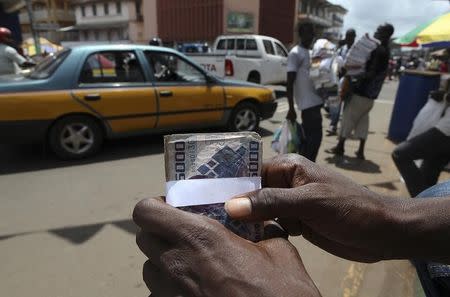Dirty money has outsized impact on world's poorest, data shows

By Stella Dawson WASHINGTON (Thomson Reuters Foundation) - Dirty money stashed overseas to hide the proceeds of crime, corruption and tax evasion has an outsized impact on the world's poorest countries, a new study has found. The more illicit finance flowing out of a country relative to its output, the higher its levels of poverty and economic inequality and the lower its development, Global Financial Integrity (GFI), a policy research group, said in a report released on Wednesday. It analyzed data from 2008 to 2012, from 82 countries that are highly indebted and less developed. In Liberia for example, illicit financial outflows reached 61.6 percent of gross domestic product on average between 2008 and 2012, and 80.6 percent of total trade volume, GFI said. The money lost could have funded its health budget four and half times over, in a country where 63.8 percent of the population lives in poverty, and income inequality as measured by the Gini index - with zero meaning equality, and 100 inequality - is high at 38, according to World Bank data. Togo had the worst illicit outflows, at 76.3 percent of its GDP, followed by Liberia. In Honduras, a country plagued by drug crime and violence, illicit outflows were 21.7 percent of GDP, or $442 per capita in a country where 64.5 percent of people live in poverty. "This study highlights that illicit financial flows are pervasive and pernicious in the developing world," said Tom Cardamone, GFI managing director. World leaders are paying increasing attention to the nearly $1 trillion in illicit finance estimated to leave poor countries each year, money they say could help replace the shrinking amounts of foreign aid and support ambitious new development goals. At the G7 summit next week, the leaders of Germany, the United States, Britain, France, Canada, Italy and Japan will discuss tax evasion. Cardamone said one popular accounting method used to avoid taxes is trade mispricing - the deliberate inflation of import invoices or deflation of export invoices - which is used to move up to 80 percent of illicit funds offshore. Anti-poverty groups are calling for a crackdown on this form of tax evasion. (Reporting by Stella Dawson, Editing by Alisa Tang; Please credit the Thomson Reuters Foundation, the charitable arm of Thomson Reuters, that covers humanitarian news, women’s rights, corruption and climate change. Visit www.trust.org)

 Yahoo Finance
Yahoo Finance 